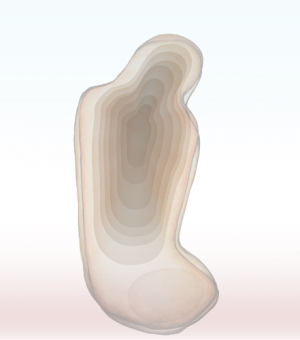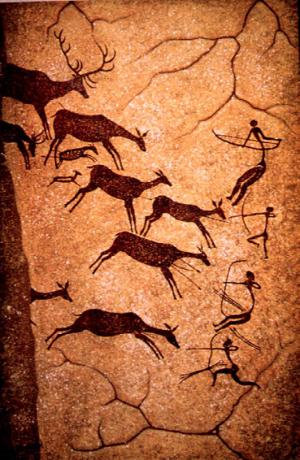Serendip is an independent site partnering with faculty at multiple colleges and universities around the world. Happy exploring!
The sapient paradox
Towards Day 13 of Evolving Systems course
I. coursekeeping
* seems a very long time ago we last met...
* welcome back! (any relevant stories, from break, of evolving cultural systems....?)
* my two "evolutionary" cultural events @ Oberlin College (one going back, one forward in time):
"Kathakali group performing "The Origins of Ravana" (the enemy of Rama) and McBeth, restaged in the American South during Reconstruction
* no paper due this week!!!...
* note that conferences have been kicked forward a week, due to break: as scheduled with Bingqing, Tiannan, Sarah, Kirsten tomorrow morning; Beatrice Thursday @ 4.
* finish reading Octavia Butler's novel, Parable of the Sower, for Thursday (quite a few postings about this already, if you want a heads up...)
* also begin imagining/working on a paper for next week--your last in the sequence about cultural evolution: follow Butler in thinking about something which includes a future; this could be a continuation of what you've already written, but you need not be bound by that;
it could be a meditation on Butler's novel, read through the lens of the cultural perspective you've been exploring (filial piety, evolution of education; basically: go where you are interested and can learn/teach something
Olivia: inventions cannot be predicted .... Ten years ago, who could predict there would be an invention called Facebook, which changes the way we socialize? ... I strongly believe cultural changes are unpredictable.
* reading one or two of your papers, with thoughts towards their possible evolutions
 |
 |
II. follow up on these possibilities w/ some of your on-line responses to Renfrow's essay on "the sapient paradox" and to the discussion we had with Emily before break: how predictable is cultural change? what role do the physical and biological environment and individual choice play?
Renfrow, Chapter 5: on the huge gap between first appearance of homo sapiens and earliest agricultural revolution: new inherent genetic capacity w/out rapidly visible effects--why the delay in modern human behaviors?
Renfrow, Chapter 6: on cognitive archeology studying us as symbol - making animals: our thinking involves two radical procedures of abstraction: forming categories, then representing them; there is no one generalized story of human progress
Olivia: I don’t understand why the gap is a problem .... The appearance of Homo sapiens is in speciation phase, and agriculture revolution is in tectonic phase .... I don’t understand why there is a paradox.
Emily's description of her process of art-making also suggested nothing paradoxical about the need for a "pause," and many of you found this helpful in thinking about your own work:
schu: Emily’s talking made me see more things in myself. The idea of hibernation is great ....more practice will help to make me think more and record more.
FluteSound4: Emily said that she needed time off to finish her art. Time to just sit there and take a break or ponder the art and it's meaning without really physically working on it. I could relate to this in my writing....
Writing and art are ... always unfinished .... Picasso was never let into a museum by himself because he would always sneak in his paints and paintbrushes and start working on his "finished" paintings all over again ....
SarahAnn: I really liked having the artist come and talk with us on Thursday. I found myself comparing her ... period of hibernation to my writing process .... It helps unclog my brain. I also liked the concept of discussing the evolution of a series of paintings about evolution .... the concept of the reflection of the subject ... in its own creation.
LemonKoala: One point Emily brought up about her creation process was really inspiring .... The pause ... allowed the idea to transform on its own. I found that really reasonable to explain the huge gap between first appearance of homo sapiens and earliest agricultural revolution .... It takes time ... for us to realize that something did happen. I think this phenomenon applies to some other situations. I think it will be helpful if we can put less pressure or focus in certain thing if we really are at a point of dilemma.
Aimee: I admired how neatly her artwork flowed from one theme to the next, from biological evolution to cultural, but I felt in some way, cheated. Why hadn't she presented the images in the order that she created them? To do so would be the best representation of her thought processes. By forcing evolution in her artwork, the artist lied to us. She forced us as viewers to create a construct that hadn't existed in the first place.
Further reflections on this process on constructing:
Paul: The story of evolution is not the way to account for the present which in turn makes it possible to predict the future; it is instead a way to make sense of the present which opens new possibilities for conceiving futures .... Science/inquiry is not simply an observer of a process but also a contributor to it, in ways that open new possibilities but will always have somewhat unpredictable future consequences as well?
[is/how is our class contributing to the cultural change we are studying....?]
Lemon Koala: the huge gap between revolutions ... could depend on the standard of revolution. The definition of progress could affect our conclusion ... two different geographic locations had development in different areas ... [don't] use one aspect to value the evolution in all areas....
elisagogogo: Since the changes happen so quickly and unpredictably that we could never really know what will happen next, why don’t we cherish the present instead of working for unpredictable future?


